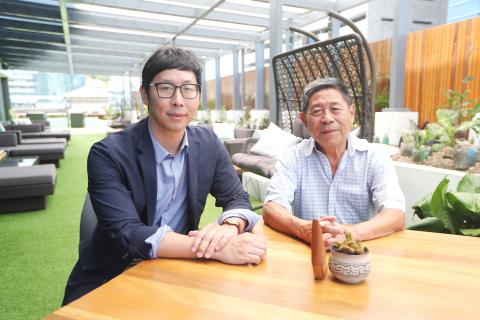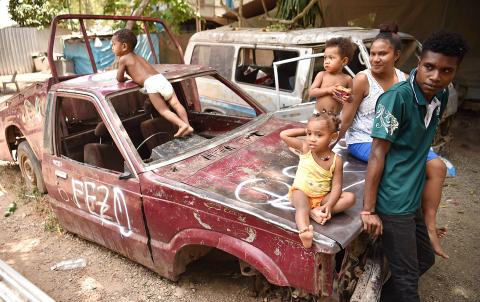Papua New Guinea is one of the poorest countries in the world. However, Wu Fu-tsai, who has been cultivating the market for four decades, says the country is like “A beggar sitting upon a mountain of gold.” Although Papua New Guinea is sitting on an abundance of resources, it lacks the required processing technology, and so is reliant on imports, Wu says.
Wu, 72, is the president of the Papua New Guinea Taiwan Fellowship Association. After leaving the army in Taiwan, Wu initially went to Indonesia to work in the lumber industry. However, after the Indonesian and Malaysian governments banned the export of timber from their countries in 1976, Wu, assisted by a friend, came to Papua New Guinea to work in the fishing industry and became the first Taiwanese business to set up shop in the country, exporting fish primarily to Japan, South Korea and Taiwan. At the time, the company would export approximately two 40-foot containers worth of product every month.
Wu recollects the people and culture were completely unfamiliar to him when he pitched up in Papua New Guinea. The government of the day was extremely inefficient, Wu says: it took him all of two years to obtain his company’s first licence. The concept of land ownership rights also differs drastically from other countries, Wu says. In Papua New Guinea, land is commonly owned by local residents. If someone wants to lease or purchase land, they must first obtain agreement from all the locals before they can make an application to the relevant national government body. This meant Wu had to spend a great deal of time flying around the country’s mountainous areas in helicopters.

Photo: CNA
照片:中央社
Today, there are approximately 100 Taiwanese business people trading with Papua New Guinea, Wu says, and adds that if Taiwanese businesses want to do business here, there are opportunities in agriculture, fishing and industry since, locally, there is “almost no technology.” Wu cites coffee as an example: Papua New Guinea is an abundant producer of coffee beans, but it has no processing factories, so it exports raw beans and imports instant coffee.
Wu says the reason for the small amount of trade between Papua New Guinea and Taiwan is because Taiwanese, unfamiliar with the country and having concerns about public order, tend to stay away. However, Wu says: “In fact, public security here is not as bad as people imagine,” and if there are Taiwanese businesses interested in setting up here, Wu says he would gladly lend a helping hand. Four generations of Wu’s family have emigrated to Papua New Guinea. His son, Wu Hung-po, works as a foreign trade ambassador at the Papua New Guinea Department of Trade, Commerce and Industry, responsible for investment promotion from the Asian region. Wu’s daughter, Wu Hung-yu, has opened a Vietnamese restaurant that is popular with the local Caucasian population.
China has in recent years provided a constant stream of aid to Papua New Guinea for the construction of basic infrastructure. As a result, wave after wave of Chinese engineers have arrived in the country and, discovering there are profits to be made, have returned to do business once their projects are completed. However, Wu says that most have focused on running supermarkets, grocery stores and other retail businesses. Wu believes there is a good opportunity for Taiwanese businesses to penetrate into technology-related industries.

Photo: AFP
照片:法新社
(CNA, Translated by Edward Jones)
巴布亞紐幾內亞是全世界最貧窮國家之一,不過,在當地深耕四十年的吳福財說,其實巴紐就像「坐在金山上的乞丐」,坐擁豐沛資源,但卻沒有相應的加工技術,反而必須仰賴進口。
現年七十二歲的巴布亞紐幾內亞台灣同鄉會會長吳福財,退伍後就到印尼從事伐木業,一九七六年印尼、馬來西亞禁止原木出口後,他在朋友力邀下到巴紐從事漁業,成為第一個在巴紐發展的台商,主要出口至日本、南韓及台灣,一個月出口量約兩個四十呎貨櫃。
吳福財回憶,當年人生地不熟,當地政府行政效率低落,公司第一張證照辦了兩年才拿到,而當地地權觀念與其他國家不同,土地是當地居民共有,若要租地或買地必須取得所有「地主」同意,才能向國家申請,因此也必須常常坐著直升機來往山區。
如今在巴紐經商的台商約有百人,吳福財認為,若台商要來巴紐發展,「農業、工業、漁業都有機會」,因為當地「幾乎沒技術」,例如當地盛產咖啡豆,但卻沒有加工廠,因此變成必須出口原豆、進口即溶咖啡。
吳福財說,巴紐台商少,主要是台灣人對巴紐不熟悉,聽說治安差就不太敢來,但「其實沒有想像中差」,而且若有台商想來,他也很樂意幫忙。吳福財一家四代都已移居巴紐,兒子吳弘博更是巴紐貿易商業部貿易大使,負責向亞洲區招商,女兒吳弘渝則開設越南餐廳,受到巴紐白人喜愛。
中國大陸近年持續援助巴紐做基礎建設,來自中國的工程隊一批批進到當地,吳福財說,很多中國人來看了之後發現有利可圖,工程結束後自己也會來做生意,不過多以超市、雜貨店等零售業為主,若台商要切入,技術相關產業是不錯機會。
(中央社)
Follow up
讀後練習
Papua New Guinea hosts APEC summit
Last weekend, world leaders descended on the impoverished Asia-Pacific nation of Papua New Guinea for the annual Asia Pacific Economic Cooperation (APEC) summit. This year’s meeting was the first in the summit’s history to end without a formal leaders’ statement.
Hosting the economic and political powwow was a big risk for Papua New Guinea’s government and came with a hefty price tag. Due to security concerns, world leaders were housed in a chartered cruise ship moored alongside the nation’s capital, Port Moresby, while the government raised eyebrows by purchasing 40 Maserati luxury sports cars to ferry delegates to and from conference venues.
In recent years, China has lavished cash on the nation as part of its Belt and Road Initiative. However, some of the infrastructure projects, such as a six-lane highway in the nation’s capital — dubbed “the road to nowhere” — have drawn criticism for being improperly planned and of questionable utility. The US has repeatedly criticized China’s Belt and Road Initiative as a form of “debt-trap diplomacy” that forces staggering levels of debt on poor countries.
Earlier this month, Australia announced a 2 billion Australian dollar South Pacific infrastructure fund, widely seen as a move to counter Beijing’s growing influence in a region which Australia traditionally views as its own “backyard.”
(Edward Jones, Taipei Times)

As we bundle up in thick coats to stay warm during the winter, there is a population that has already adapted to extremely low temperatures. These people live in the remote city of Yakutsk, the coldest city on Earth. Yakutsk is situated in the heart of Siberia, which is the capital of the Sakha Republic in Russia. This historic mining city began to flourish in the 19th century following the discovery of gold deposits. Given its construction on permafrost, the average temperature in the city remains below 0°C for over half the year, with winter temperatures dropping to an astonishing -50°C.

本文由生成式 AI 協作,本刊編輯編修。 Have you ever wondered how an athlete who once performed flawlessly can unexpectedly struggle with the simplest tasks? Imagine an __1__ pitcher who suddenly can’t find the strike zone—this is the “yips” in action. This __2__ phenomenon primarily affects athletes in sports like baseball and golf. It is characterized by a sudden loss of motor skills, leading to difficulties with routine actions that were __3__ before, such as a pitcher’s throw or a golfer’s putt. For instance, American baseball pitcher Steve Blass, who had a stellar performance in the 1971 World Series, suffered a sudden inability

A: Apart from 2NE1, Rain and Maroon 5, Japanese band Yoasobi is set to hold two shows in Taipei this weekend. B: Yoasobi? A: Yoasobi is a J-pop duo formed by Ayase and Ikura in 2019, and it’s loved by young people. Haven’t you heard? B: Oops, I’m feeling a little old. A: It sings the theme songs of “Oshi No Ko” (“My Idol’s Children”) and other TV series, leading it to gain popularity among young people. A: 除了2NE1、Rain、魔力紅,日本熱門樂團Yoasobi本週末也將連唱兩場。 B: Yoasobi樂團? A: 這是由Ayase、Ikura在2019年組成的雙人團體,近年來大受年輕人歡迎!你沒聽過嗎? B: 天啊我覺得自己老了。 A: 他們唱了《我推的孩子》等人氣影視作品主題曲,所以大受年輕人喜愛。 (By Eddy Chang, Taipei Times/台北時報張聖恩)

A: Happy Year of the Snake! Did you do anything special during the Lunar New Year holiday? B: I went to K-pop girl group Apink’s concert. How about you? A: I just stayed at home. But I’m going to girl group 2NE1’s show on Saturday. B: Wow, I really love their megahit “I Am the Best,” better known by its Korean title “Naega jeil jal naga.” A: I’m so glad that 2NE1 reunited last year, eight years after they disbanded in 2016. A: 蛇年快樂!你春節有做什麼特別活動嗎? B: 我去了南韓女團Apink的演唱會,你呢? A: 我都宅在家裡,不過這週六要去韓流天團2NE1的演唱會。 B: 我愛該團神曲《我最紅》,韓文歌名《Naega jeil jal naga》超洗腦。 A: 她們2016年解散8年後,去年終於合體真令人開心。 (By Eddy Chang, Taipei